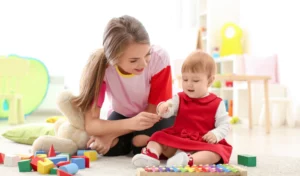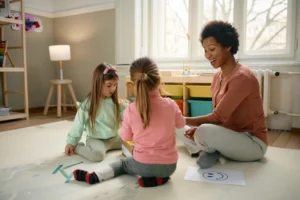Being a professional babysitter is likely the funnest job ever, but it also requires specific expertise to handle whatever comes your way. If you’re looking to find work as a babysitter, it’s important to cultivate some foundational skills.
The Skills That Every Babysitter Should Have
First Aid and CPR Training
Accidents happen, even when we are trying our best to be safe. As a babysitter, children (and their parents) look to you to know how to handle emergencies of various kinds. Taking a first aid and CPR course as a babysitter is always a good idea. Many hospitals and community centers offer specific courses for babysitters that include infant first aid. Before you consider a job as a babysitter, run through a mental checklist: are you comfortable handling cuts, burns, choking, and allergic reactions? If you’re unsure how to manage any of these situations, brush up with a course or some additional research. Always better safe than sorry!
An Understanding of Child Development
Understanding primary child development stages will help you be a better babysitter. You’ll be able to tailor activities to a child’s age and abilities while also engaging with them in ways that support their growth. For example, if you know what motor skills a child should develop at their specific age, you can incorporate activities and games that reinforce these skills. Similarly, if you know the child you’re caring for is at an age when they are developing their memory, you can include memory games in your time together. With some basic child development knowledge, you can become an important part of a child’s education and growth. Plus, parents are delighted to come home and learn their kiddos have made positive steps forward!
Communication & Interpersonal Skills
Communication and interpersonal skills can help maintain positive relationships with children and their parents. Being transparent and professional with parents will help them feel more comfortable leaving their children with you. Transparency includes admitting when you’ve made a mistake or need help. Similarly, communicating clearly and calmly with children will help you build trust in your relationship and create a supportive environment where they feel safe communicating their needs. Practice active listening and empathy outside of your day-to-day life so you can bring these skills into your babysitting relationships.

Time Management Skills
Time management is a crucial skill for a babysitter. Often, parents have time-sensitive plans and rely on their sitters to show up on time, so you must be able to be consistently punctual. Children also frequently rely on adults to support them as they move through their routines. As a babysitter, you might be responsible for ensuring children do their homework, get play time, move through their bedtime routine, and get to bed at their usual time. Managing these tasks and transitions help children feel supported. One Jovie babysitter recommends wearing a watch as it’s much easier to keep track of the time versus having to always pull out your phone.
Problem-Solving Skills
Just like any other part of life, things don’t always go according to plan when babysitting. That’s why it’s important to be an adept problem-solver and to think on your feet as a babysitter. Challenges of all kinds can arise while babysitting – from medical emergencies to behavioral snafus to technical problems in the home. Being prepared for potential accidents or injuries will help you stay calm if they occur. Know where the first aid kit, cleaning supplies, fire extinguisher, and flashlights are in the house ahead of time. It’s also important to create clear expectations with the parents for handling behavioral issues. But if something comes out of the blue, you’ll need to use quick decision-making skills. Getting as much information upfront as possible will allow you to navigate unseen problems with a clear head and even come up with a creative solution!
Mindfulness and Patience
They say patience is a virtue, but it’s an absolute must when babysitting. Children can test your patience in all kinds of ways. Practice mindfulness and nervous system regulation techniques, such as deep breaths or other grounding exercises. Going back to #2, it helps to have a basic understanding of child development so you can have realistic expectations for a child’s behavior.
Conflict Resolution Ability
It’s common for children to act out and test boundaries when their parents aren’t home. Maybe they won’t want to follow bedtime rules or will argue with one another about sharing a toy. As the babysitter, you are the leader and leaders need to be comfortable engaging with conflict and have strategies in their back pocket to resolve them. Being able to regulate yourself amid conflict is critical (seek skill #6). Setting firm but compassionate boundaries, listening with empathy, and validating children’s emotions can all go a long way when conflict arises. As you get to know the children you care for, you will be able to notice when a conflict is stirring and can prevent it from escalating.
Find a Babysitting Job with Jovie
You have a lot of skills and experience to offer – now it’s time to put it to use! Jovie matches babysitters with families looking for experienced sitters like you. Plus, your local Jovie team can offer training and education so you can continue to build upon your babysitting skills. Apply to your local Jovie to start your adventure in babysitting!













